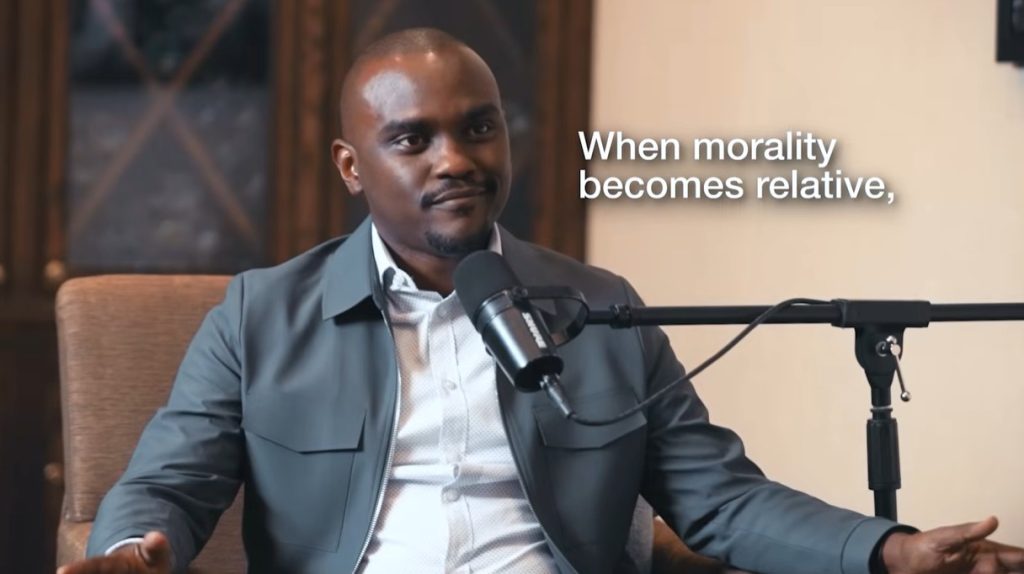Kigali Pastor Hassan Kibirango Navigates AI, Morality, and Modern Masculinity on ‘The Long Form Podcast’

KIGALI—Hassan Kibirango, a leadership coach and men’s pastor at Christian Life Assembly (CLA) in Kigali, recently offered profound insights into the challenges facing faith and family in the modern world during an appearance on “The Long Form Podcast”. Kibirango, who has spent nearly two decades mentoring leaders and helping men rediscover purpose, explored themes ranging from the impact of artificial intelligence (AI) on belief to the fragility of the Rwandan family.
A Personal Journey and the Absolute Nature of Morality
Kibirango shared the dramatic story of his transition to Christianity, noting that he was born and raised in a Muslim home and practiced Islam for the first 19 years of his life. His conversion followed a tragedy when his Christian mother passed away. He was convicted by the immense “demonstration of love from strangers”—Christians from his mother’s small fellowship church—who managed the burial arrangements, contrasting sharply with the “rift” he saw with his father’s side of the family. Kibirango’s childhood was shaped by a “mixed religion background”, as his liberal Muslim father had multiple wives, only two of whom were Muslim.
In response to arguments that humans do not need God to be moral, Kibirango strongly advocated for the Christian view that morality “has a standard and it has a moral lawgiver who is god”. He called the idea of morality being relative or having a sense of fluidity a “dangerous slippery slope”. For Christians, the moral law given by God is “unchangeable” and “an absolute”. He conceded that atheists can be moral, but argued that Christian morality is tied to an “innate relationship with our god”.
The pastor also addressed complex theological issues such as the problem of free will and suffering, noting that God gave humans the choice to love or reject him, not creating them as “robots”. While acknowledging that free will has led to immense consequences, like the genocide currently happening in Darfur, Kibirango maintained that God “didn’t create us that so so we can all burn in hell”.
Marriage, AI, and the Essence of Love
In his role counseling couples, Kibirango discussed the difficult reality of troubled marriages. He advises finding forgiveness and reconciliation, even in cases of infidelity, if the cheating party confesses and is willing to change.
Regarding divorce, Kibirango confirmed that Christian Life Assembly has a clear policy not to remarry divorced people. He stated that the church discourages divorce due to the devastating effects it causes, particularly where children are involved, though he acknowledged that the Bible does allow for divorce, such as in cases of adultery, or when life-saving separation is necessary (like domestic violence). The church’s primary recommendation in troubled marriages remains redemption and reconciliation through counsel.
When discussing love and technology, Kibirango distinguished between algorithmic matchmaking (facilitated by neuroscience and data) and genuine, sustained marital love. He argued that technology might get people “through the door,” but it cannot sustain a marriage. Love, he stated, “ultimately becomes a will and a behavior” that demonstrates commitment and anchors trust.
The Challenge of Super Intelligence and Immortality
The conversation delved into futuristic concepts, including the idea of humanity upgrading itself into gods and the advent of super intelligence. Kibirango views this human ambition not as a “next project” but as an ancient, recurring desire to “be like God” or to live forever, reflecting the “creative correlation to their creator”.
Addressing the hypothesis that technology could eventually cure aging and eliminate death, Kibirango remained resolute in his theological convictions, stating that “it has been marked for a man to die”. He argued that even if death were taken out of the picture, it would not take away “the god question or the faith question”.
Confronting Colonial Legacy and Men’s Loneliness
The pastor addressed the painful history of Christianity being weaponized in Rwanda, noting that the colonial project used faith for subjugation, citing the example of the exile of King Musinga. Kibirango separated the “way of Christ” (which taught love and service) from the innate evil in the “heart of man” that uses religion to fulfill its agenda. He stressed that Christianity should enhance Rwandan culture and values, not divorce believers from them.
Finally, drawing on his experience counseling men, Kibirango highlighted the prevalence of emotional loneliness and “quiet desperation” among men. He observed that men often internalize pain and hide behind success or titles. He identified unmet expectations as a leading cause of men’s unhappiness and emphasized the necessity of peer accountability and vulnerability. Kibirango encourages men to find one or two ride-or-die friends with whom they can share their “nakedness” and pull each other “out of the rubble,” as men tend to operate best when sharing vulnerabilities “shoulder-to-shoulder”.
Reflecting on his life, Kibirango concluded that even if he discovered tomorrow that there was no God, his life would still be worth living, citing his family, his efforts to serve people, and the inspiring resilience of Rwanda in recovering from the genocide as anchors of meaning.

SUBSCRIBE TO OUR NEWSLETTER





















